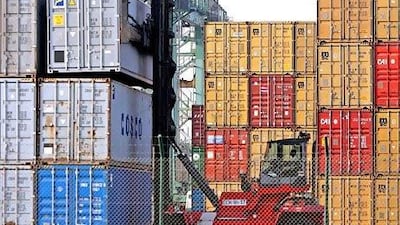The outlook for business across the UAE is strengthening despite troubles in the global economy as new orders for private-sector companies picked up last month.
Almost one in three companies responding to HSBC's purchasing managers' index (PMI) indicated a higher number of orders last month. Improving economic and market conditions were cited by respondents as reasons for the rise. Growth in new orders remained above 60 points for the third consecutive month.
Overall, the headline non-oil PMI index came in at 53.7 points, almost unchanged from 53.8 the previous month. A reading above 50 indicates growth in business activity.
"The headline numbers are very solid and show growth right through the non-oil private sector," said Simon Williams, the chief economist for the Middle East and North Africa region at HSBC. "The UAE slowed very aggressively in 2009 and 2010 compared to other markets and is still on the upswing."
The results show businesses are gaining strength against a mixed global economic backdrop. Saudi Arabia's PMI data, released on Monday, showed a weakening in activity to 57. But activity in the debt-riddled euro zone as well as Egypt remains in negative territory, the latest PMI data shows.
Expansion in new orders and exports last month suggest UAE businesses are well placed to continue growing in the months ahead.
Employment creation rose during the month, although the level of growth was the lowest in eight months. Companies that hired staff linked the move to higher output requirements. Average salaries also rose during the month.
Average charges set by companies dipped for the second time in four months as businesses responded to increasing competition. Overall input costs rose further but the rate of increase remained below the average for the series.
Growth of purchasing activity remained solid as companies reacted to a rise in customer demand.
The latest GCC data chimes with other research released yesterday showing the region is outperforming other parts of the world.
Over the past 12 months, import volumes to the Middle East and emerging Africa have grown 11.4 per cent compared with 3.7 per cent in emerging Asia and 3.1 per cent in the United States and a 2.5 per cent contraction in the euro zone. This data is compiled in the Institute of Chartered Accountants in England and Wales fourth-quarter briefing report by the United Kingdom's Centre for Economics and Business Research (CEBR).
Within the GCC, growth this year was expected to reach 5.6 per cent, more than twice the speed of the global economy, it said.
"It looks like the region has got over the dark days of 2009," said Douglas McWilliams, the chief executive of CEBR. "Since then there has been a turnaround and there are signs even the property market is picking up."
High oil prices were helping the region to weather the global economic slowdown, said the report.
Although oil prices dipped below US$110 a barrel in October and last month, they remain close to the average of $112 reached over the last 12-month period.
The CEBR report also forecast oil prices between next year and 2017 and the likely impact of those levels on crude exporters.
It warned high oil prices were expected to fall slightly next year because of the weak pace of global growth and with Libyan oil returning to full production. Prices would then pick up marginally each year until 2017, it forecast.
In response to the relative stability of prices in the medium term, room for big government spending rises would be more limited.
Between 2001 and 2011 oil prices rocketed by about five times from $20 per barrel to about $100, giving GCC governments the ability to embark on ambitious infrastructure projects and social spending rises.
Government spending would be more closely linked to the price of oil in the years ahead, said Mr McWilliams.
"Instead of more coming in every year we are in a world now where we have to cope with the sort of money roughly speaking that's already there," he said. "Over the next 10 years, diversification will become much more important."

